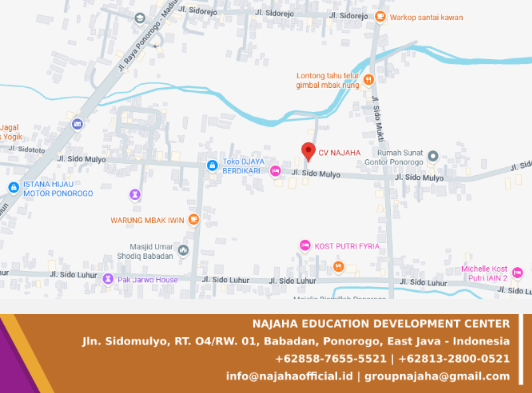Implementation of Daily Performance Monitoring in Improving Moral Education
DOI:
https://doi.org/10.59683/ijle.v1i1.192Keywords:
Moral Education, Daily Performance Monitoring, Student BehaviorAbstract
This article aims to describe the implementation of daily performance monitoring in improving Adab education at Azmania Islamic Boarding School in Ponorogo. The research design used in this study is descriptive qualitative research. Data collection techniques include observation, interviews, and documentation, while data analysis techniques use data analysis and Miles and Huberman's model, including data reduction, data display, and conclusion drawing. The research findings show that the role of daily performance monitoring in implementing Adab education is crucial. It helps teachers to monitor, evaluate, and make policies to improve the Adab education system. Furthermore, the Adab education at Azmania Islamic Boarding School has improved over time, from initially not understanding daily Adab to being able to implement it well. The implementation is carried out through three stages of the method, namely exemplary behavior, habituation, and knowledge insight.
References
Ashari, R., Syam, A. R., & Budiman, A. (2017, November). The World Challenge of Islamic Education Toward Human Resources Development. In Proceeding of International Conference on Islamic Education (ICIED) (Vol. 2, No. 1, pp. 169-175).
Alfi, L. (2018). Konsep Ilmu Menurut Syed Muhammad Naquib Al-Attas. Tasfiyah: Jurnal Pemikiran Islam, 2(2).
Anwar, S. (2016). Peran pendidikan agama Islam dalam membentuk karakter bangsa. Al-Tadzkiyyah: Jurnal Pendidikan Islam, 7(2), 157-170.
Ashari, R., & Tobroni, T. (2021). Study of Islamic Religious Education in Prospective Anthropology. Educatio: Journal of Education, 5(3), 217-223.
Eriyanto, E. (2022). Pembentukan Karakter Melalui Kultum (Kuliah Tujuh Menit) Pendidikan Agama Islam. GUAU: Jurnal Pendidikan Profesi Guru Agama Islam, 2(8), 9-16.
Harun, M. H. (2015, October). Pendidikan sebagai warisan Islam: Kajian dalam perspektif sejarah. In Jambi: Prosiding Seminar Internasional Fakultas Ilmu Tarbiyah dan Keguruan IAIN Sulthan Thaha Saifuddin Jambi.
Hendayani, M. (2019). Problematika Pengembangan Karakter Peserta Didik di Era 4.0. Jurnal Penelitian Pendidikan Islam, 7(2), 183.
Katni, K., & Laksana, S. D. (2020). Model Manajemen Pendidikan Adab Anak Usia Pendidikan Dasar DI MIN Demangan Madiun Jawa Timur Indonesia. AL-MURABBI: Jurnal Studi Kependidikan Dan Keislaman, 6(2), 117-129.
Kencana, R., Manalu, A. W., Ningrum, S., Yusnita, Y., & Wijayanti, L. D. (2022). Dampak Pembelajaran Daring pada Karakter Anak Usia Dini. BUHUTS AL-ATHFAL: Jurnal Pendidikan dan Anak Usia Dini, 2(1), 130-142.
Khamalah, N. (2017). Penguatan pendidikan karakter di madrasah. Jurnal kependidikan, 5(2), 200-215.
Ikhwan, A., Febriansyah, F. I., & Syam, A. R. (2022). Metode Demonstrasi dalam Peningkatan Motivasi Belajar Tilawatil Qur’an. Jurnal Pendidikan Nusantara, 1(2), 100-110.
Laksana, S. D. (2021). Pentingnya Pendidikan Karakter Dalam Menghadapi Teknologi Pendidikan Abad 21. Jurnal Teknologi Pembelajaran, 1(01), 14-22.
Lubis, R. R., & Nasution, M. H. (2017). Implementasi Pendidikan Karakter di Madrasah Ibtidaiyah. JIP (Jurnal Ilmiah PGMI), 3(1), 15-32.
Machsun, T. (2016). Pendidikan Adab, Kunci Sukses Pendidikan. EL-BANAT: Jurnal Pemikiran dan Pendidikan Islam, 6(2), 102-113.
Moleong, L. J. (2017). Metodologi Penelitian Kualitatif (Revisi). Bandung: PT remaja rosdakarya, 102-107.
Muali, C. (2017). Rasionalitas Konsepsi Budaya Nusantara dalam Menggagas Pendidikan Karakter Bangsa Multikultural. Jurnal Islam Nusantara, 1(1), 105-117.
Muwaffaq, A. (2022). Lemahnya Penilaian Afektif Berdampak Buruknya Prilaku Humanistik Siswa. Nusantara: Jurnal Ilmu Pengetahuan Sosial, 9(2), 416-422.
Risdiany, H., & Dewi, D. A. (2021). Penguatan Karakter Bangsa Sebagai Implementasi Nilai-Nilai Pancasila. Jurnal Pendidikan Indonesia, 2(04), 696-711.
Sukmadinata, N. S. (2011). Metode Penelitian dan Pendidikan. Bandung: PT Remaja Rosdakarya.
Sumaryanti, L., Syam, A. R., & Syukroni, A. (2020). Urgency of implementing adab for students of elementary school in the perspective of the Qur’an and hadith. AL-ASASIYYA: Journal Of Basic Education, 5(1), 1-12.
Syam, A. R. (2015). Manajemen Pendidikan Kedisiplinan Santri Di Pondok Pesantren: Studi Kasus di Pondok Modern Darussalam Gontor (Doctoral dissertation, Universitas Islam Negeri Maulana Malik Ibrahim).
Zh, M. H. R., Putra, M. F. B., Kuswandi, D., Wedi, A., & Ardiansyah, A. (2024). Developing Wordwall Evaluations in Blended Islamic Education Using the Smith and Ragan Model. Al-Aulia Jurnal Pendidikan Dan Ilmu-Ilmu Keislaman, 10 (1)(June). https://doi.org/10.46963/aulia.v10i1.1915
Downloads
Published
How to Cite
Issue
Section
License
Copyright (c) 2025 Rohmi Suminar Wahyuningsih, Mohd Yasin bin Mohd Amin, Katni, Aldo Redho Syam

This work is licensed under a Creative Commons Attribution 4.0 International License.
Open Access
International Journal of Learning and Education (IJLE) is an open access journal which means that all content is freely available without charge to users or their institutions. Users do not have to register to access the journal’s content. IJLE provides immediate open access to its content, without any embargo period. Users are allowed to read, download, copy, distribute, print, search, reuse or link to full text articles without asking prior permission from the publisher or the author as long as proper citation of the original publication is given. This is in accordance with the Budapest Open Access Initiative definition of open access.
Copyright and Licensing
The IJLE content is licensed under a Creative Commons Attribution 4.0 International license (CC BY 4.0). Authors retain unrestricted copyright and publishing rights of their articles. Authors grant the Publisher NAJAHA a license to publish the article and identify itself as the original publisher. Authors also grant any third party the right to use or reuse the article freely as long as its original authors and citation details are identified.
Self-Archiving
IJLE allows and encourages authors to self-archive their articles on institutional or other specialized repositories, their personal websites and social-networking sites such as ResearchGate and Academia.edu. Authors are advised to use the final PDF version published on the Journal’s website for self-archiving purposes. However, it’s not an obligation and authors are free to use the version they prefere; pre-print, post-print or publisher’s PDF version.
There is no embargo on the self-archiving of articles. Authors are allowed deposition of articles on repositories, personal websites and social-networking sites immediately after publication on the journal website. Accepted manuscripts can be also self-archived by authors.














